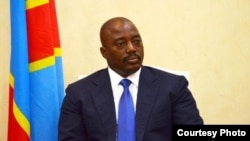The Democratic Republic of Congo’s (DRC) president has granted an amnesty for prisoners convicted of belonging to a banned movement, the Bundu dia Kongo (BDK), and to prisoners over age 70, with some exceptions. He also reiterated his call for a national political dialogue.
The BDK describes itself as a religious movement campaigning for greater autonomy for the Bas Congo region in southwestern DRC. Its leader, Ne Muanda Nsemi, claims to have been guided by visions.
Some of his followers, armed with stones and sticks, clashed with security forces in early 2008. The human rights organization Freedom House said around 100 BDK members died at that time, and 150 were arrested.
Recently, Ne Muanda Nsemi backed DRC President Joseph Kabila’s plan for a political dialogue and appealed for an amnesty for BDK prisoners, which has now been granted. Kabila also has amnestied prisoners over age 70, except those convicted of offenses such as war crimes, corruption, sexual violence and threatening state security.
In an address to the nation on New Year’s Eve, Kabila stressed his intention to hold a political dialogue in 2016.
“Through the political dialogue,” he said, “we must reach a consensus on various questions in order to lay a new basis for forthcoming elections.”
A spokesman for the country’s biggest opposition party, the UDPS, Augustin Kabuya, said the ideas in Kabila’s speech are good but behind the ideas there is a hidden agenda. Kabuya added that the UDPS cannot join in the dialogue just for the sake of dialogue.
“We cannot gloss over what’s happening,” he said. "People are being arrested and convicted unjustly, so how can we trust the regime enough to join in the dialogue?”
Kabuya questioned whether the promised amnesty would take place.
Opposition parties have accused Kabila of calling a dialogue in order to hang onto power beyond his constitutional two-term limit, which is up next December.
A political analyst, Felicien Kabamba, told local media recently that Congolese are afraid of what could happen in 2016.
He said the head of state has reassured the population that there will not be any bloodshed, but people also expect him to say something about his own future, after December next year, and nothing has been said about that.




